Japanese Symbol for Family Japanese Symbol for Friendship
Family Chinese & Japanese Calligraphy Wall Scrolls
Yous can customize a beautiful family wall coil here.
Kickoff past clicking on the push side by side to your favorite family title beneath...
Family / Home
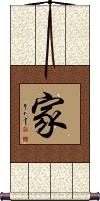
家 is the single-grapheme that means family in Chinese and Japanese.
Information technology tin can also hateful home or household depending on context.
Hanging this on your wall suggests that you put "family start".
Pronunciation varies in Japanese depending on context. When pronounced "uchi" in Japanese, it means dwelling but when pronounced "ke", information technology means family.
![]() Note that in that location is an alternating form of this grapheme. It has an additional radical on the left side but no divergence in pregnant or pronunciation. The version shown in a higher place is the virtually universal, and is also aboriginal/traditional. The prototype shown to the right is merely for reference.
Note that in that location is an alternating form of this grapheme. It has an additional radical on the left side but no divergence in pregnant or pronunciation. The version shown in a higher place is the virtually universal, and is also aboriginal/traditional. The prototype shown to the right is merely for reference.
Family Dear / Domestic Bliss

天倫之樂 means family love and joy, or domestic bliss.
The first two characters hateful, "the bonds of the family".
The third character connects this to the fourth character which ways happiness, joy, and cheerful.
Family / Members of a Family unit
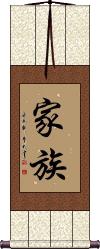
家族 is family in Japanese Kanji, Chinese and Korean.
This represents all the members of a family.
This tin likewise mean household or clan depending on the context.
Family Over Everything

This Chinese phrase means, "family above all else".
The beginning two characters mean family unit, household, or abode (they will be read equally "family" in this case).
The terminal ii characters mean supreme, paramount, or above all else.
Family and Friends

This Chinese title just ways "family and friends", or "kith and kin".
If y'all read each character more than literally, it's like, "relatives, friends, [and] good/close friends".
Family and Friends

家族や友人 means, "family and friends", in Japanese.
Family Bond / Family Ties
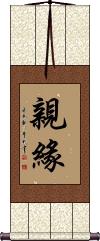
親緣 is a Chinese discussion that means affinity, family relationship, or consanguinity.
This speaks of the family unit bonds we accept with others that share the same blood or ancestors.
Family Bond / Family Ties
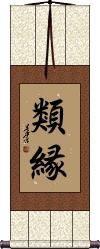
This Japanese give-and-take means affinity or family unit human relationship.
類縁 is virtually the bond shared by blood within a family or those from the same ancestor.
Family / Household
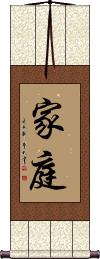
家庭 / 傢庭 is a mutual manner to express family unit, household, or home in Chinese, Japanese Kanji, and old Korean Hanja.
However, for a wall scroll, nosotros recommend the single-character grade (which is but the starting time character of this two-character word). If you want that, simply click here: Family unit Unmarried-Grapheme
The first grapheme means "family unit" or "home". The second ways "courtyard" or "garden". When combined, the pregnant is a bit different, as it becomes "household" or "family". The dwelling and/or property traditionally has a potent relationship with family unit in Asia. Some Chinese, Korean, and Japanese families have lived in the same firm for 7 or more generations!
Family Dearest
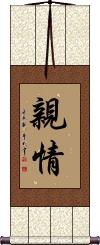
親情 means amore, especially for family unit members.
This tin as well exist translated as "family love" or "love, especially within a married couple or between parents and children".
Family unit Beloved
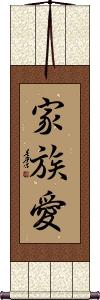
家族愛 is a Japanese title that means love of (one's) family, family unit love, or familial dear.
Forever Family

永遠的家 is a special phrase that we composed for a "family by adoption" or "adoptive family unit".
It's the dream of every orphan and foster kid to be formally adopted and find their "forever family".
The outset two characters hateful forever, eternal, eternity, perpetuity, immortality, and/or permanence. The third character connects this idea with the last character which ways "family unit" and/or "home".
Happy Family

和諧之家 means, "harmonious family" or "happy family unit" in Chinese.
The outset two characters relay the idea of happiness and harmony.
The 3rd grapheme is a connecting or possessive article (connects harmony/happiness to family).
The last character means family unit but tin also mean domicile or household.
Happy Family
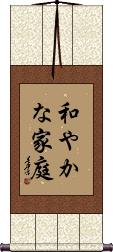
和やかな家庭 ways "happy family" or "harmonious family" in Japanese.
The commencement three Kanji create a word that means balmy, calm, gentle, serenity, or harmonious. After that is a connecting commodity. The concluding ii Kanji mean family unit, home, or household.
Annotation: Because this selection contains some special Japanese Hiragana characters, it should be written by a Japanese calligrapher.
Prophylactic and Well-Being of the Family
Kanai Anzen

家內安全 is kind of the Japanese way of saying, "Family First". It's really a Japanese proverb well-nigh the safety and well-being of your family, and/or, peace and prosperity in the household.
Some Japanese will hang an amulet in their dwelling with these Kanji on it. The purpose being to keep your family safety from harm.
According to Shinto followers, hanging this in your abode is seen as an invocation to God to always go along members of the family gratis from harm.
Nosotros were really looking for a way to say "family first" in Japanese when this proverb came up in the conversation and research. While it doesn't literally say "family first", it shows that the condom and well-being of your family unit is your first or nearly important priority. So, this proverb is the most natural way to limited the idea that you put your family unit first.
Run into Too: Peace and Prosperity
One Family Nether Sky
tiān xià yī jiā
tenka ikka

This proverb can also be translated as "The whole world is i family".
Information technology is used to mean that all humans are related under heaven.
The start two characters can be translated as "the globe", "whole country", "descended from heaven", "earth under sky", "the public" or "the ruling power".
The 2nd two characters tin can hateful "ane family", "a household", "one's folks", "a business firm" or "a home". Unremarkably this is read as "a family".
Note: This proverb can exist understood in Japanese, though not commonly used.
Any success tin not compensate for failure in the home
suǒ yǒu de chéng gōng dōu wú fǎ bǔ cháng jiā tíng de shī bài
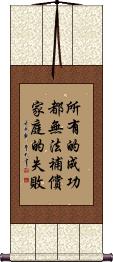
This Chinese proverb could too exist translated into English language every bit "No success can compensate for failure in the home".
Also, the word for "home" can be exchanged with "family".
Dwelling house is where the heart is

This old Chinese proverb is roughly equal to the English idiom "Dwelling house is where the heart is".
If you know Chinese, you may recognize the outset character as home and the third as the eye.
Dwelling house is where the heart is
ie to wa kokoro ga aru basho da
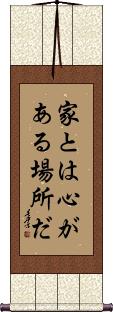
家とは心がある場所だ is, "Home is where the heart is", in Japanese.
Most Japanese will take this to hateful:
If you are with the person or at the place y'all dearest most, it becomes your truthful home.
Annotation: Because this choice contains some special Japanese Hiragana characters, it should be written by a Japanese calligrapher.
No man knows what he owes to his parents until he comes to have children of his own
ko wo motte shiru oya no on
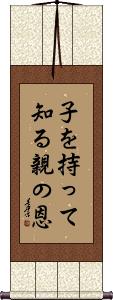
This literally translates as: Only later you have a infant, you would capeesh your parents (feel the way they practice, etc).
子を持って知る親の恩 is a bit like the "walk a mile in another human being's shoes" saying. Basically, information technology'southward near you cannot fully sympathize the plight of others until y'all experience it yourself. Information technology as well shows appreciation for the plight of parents.
This Japanese proverb can as well be translated a few more means:
No man knows what he owes to his parents till he comes to take children of his own.
1 knows not what one owes to one's parents till one comes to have children of one's ain.
Merely after you have a baby, you will appreciate your parents or feel the way they do.
Simply after becoming a parent yourself do you lot realize how much you owe [how indebted you are] to your own parents.
Note: Considering this selection contains some special Japanese Hiragana characters, it should exist written by a Japanese calligrapher.
Kid
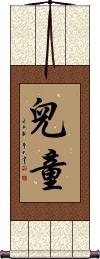
兒童 is how to write "kid" in Chinese.
There are several means to write child or offspring in Chinese but this is the best form for calligraphy, or written (versus oral) class.
If children are of import to you lot, this might be the scroll you want. Or if yous are a kid at heart, this too works.
![]() In Japanese, they use a slightly-morphed version of the original Chinese start grapheme. If you want the special Japanese version, please click on the Kanji image shown to the right, instead of the button above. Note: Japanese people would nonetheless be able to understand the Chinese version and vice versa.
In Japanese, they use a slightly-morphed version of the original Chinese start grapheme. If you want the special Japanese version, please click on the Kanji image shown to the right, instead of the button above. Note: Japanese people would nonetheless be able to understand the Chinese version and vice versa.
Spare the Rod, Spoil the Child
bàng tóu chū xiào zǐ zhù tóu chū wǔ nì
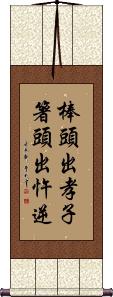
This literally translates as:
A stick (or switch) produces filial sons; chopsticks produce disobedient [ones].
Figuratively, this means:
Strict bailiwick produces dutiful children whereas indulgence produces disobedient ones.
棒頭出孝子箸頭出忤逆 is very like to this English proverb:
"Spare the rod and spoil the child".
Brotherly and Sisterly Love
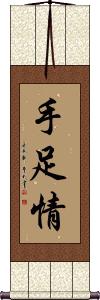
手足情 is the love betwixt siblings.
When you love, protect, intendance for, and have a deep bond that only brothers or sisters can.
The actual translation is "Paw and Foot" but it is said the human relationship between brothers or sisters is like that of hands and feet. They belong together, and complete the trunk. Even though this says "paw and foot", it will always be read with the brotherly and sisterly love meaning in Chinese.
Notation: During the past 20 years, the "One child policy" in China is slowly making this term obsolete.
God Daughter
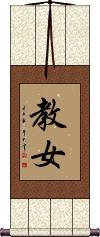
教女 is the title for a female child in which yous have a sworn duty to raise, should the daughter's parents die.
The second grapheme specifically designates that we are talking about a female child, thus the title God Daughter.
Grand Daughter
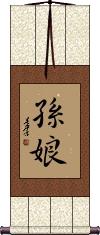
孫娘 is granddaughter in Japanese Kanji.
Mother and Daughter
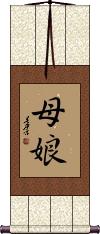
This simply means "mother and girl" in Japanese Kanji.
母娘 is an unusual selection for a calligraphy wall scroll, and can be read many different means. Your native Japanese friends might wonder what you are trying to say.
Note: This volition not make sense in Chinese.
See Also: Mother and Son
Mama / Mother / Mommy
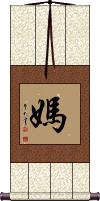
媽 is the oral way that most Chinese people refer to their mothers. Oftentimes, they volition put this together twice (two of the same character in a row) to create a word that sounds like "Mama". That'due south admittedly what lilliputian kids call their mothers in Mainland china. This Chinese "Mama" is the rough equivalent of "Mommy" in English language. Beyond a certain age, Chinese will start to just say "Ma", which is like maxim "Mom".
This entry is only here for a language lesson. This would make a strange wall scroll by Chinese standards. In Chinese, at that place are sometimes oral words that don't seem advisable when written in calligraphy, and this is one of them. See our entry for "Loving Mother" for a better choice.
See Likewise: Loving Mother
Loving Mother
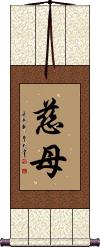
慈母 create the championship of loving mother, affectionate mother, or merciful mother.
A swell gift for your mom.
Never Requite Upwardly

The beginning character ways "eternal" or "forever", the second means "not" (together they hateful "never"). The final two characters mean "give up" or "abandon". Altogether, you lot tin translate this saying as "never surrender" or "never abandon".
Depending on how you want to read this, it is also a argument that yous will never abandon your hopes, dreams, family or friends.
Meet Also: Undaunted | No Fear | Hope
No one knows a son ameliorate than the begetter

This tin be translated as "No 1 knows a son better than his father".
This idiom is based on the idea that after spending many years together, family members know everything almost each other. Improve than anyone else, a father knows the qualities and shortcomings of his son.
If you are looking for something about "male parent and son", this is probably the best selection.
知子莫若父 is the original proverb (very old) merely others take been equanimous about various combinations of mothers, sons, daughters, and fathers.
This in-stock artwork might be what you are looking for, and ships right away...
The following table may be helpful for those studying Chinese or Japanese...
| Title | Characters | Romaji (Romanized Japanese) | Various forms of Romanized Chinese | |
| Family Home | 家 / 傢 家 | ei / uchi / ke | jiā / jia1 / jia | chia |
| Family unit Love Domestic Bliss | 天倫之樂 天伦之乐 | tiān lún zhī lè tian1 lun2 zhi1 le4 tian lun zhi le tianlunzhile | t`ien lun chih le tienlunchihle tien lun chih le | |
| Family Members of a Family | 家族 | ka zoku / kazoku | jiā zú / jia1 zu2 / jia zu / jiazu | chia tsu / chiatsu |
| Family unit Over Everything | 家庭至上 | jiā tíng zhì shàng jia1 ting2 zhi4 shang4 jia ting zhi shang jiatingzhishang | chia t`ing chih shang chiatingchihshang chia ting chih shang | |
| Family and Friends | 親朋好友 亲朋好友 | qīn péng hǎo yǒu qin1 peng2 hao3 you3 qin peng hao you qinpenghaoyou | ch`in p`eng hao yu chinpenghaoyu chin peng hao yu | |
| Family and Friends | 家族や友人 | kazoku ya yuujin kazokuyayuujin kazoku ya yujin | ||
| Family Bail Family Ties | 親緣 亲缘 | qīn yuán / qin1 yuan2 / qin yuan / qinyuan | ch`in yüan / chinyüan / mentum yüan | |
| Family unit Bond Family Ties | 類縁 | ruien | ||
| Family Household | 家庭 / 傢庭 家庭 | ka tei / katei | jiā tíng / jia1 ting2 / jia ting / jiating | chia t`ing / chiating / chia ting |
| Family Dear | 親情 亲情 | qīn qíng / qin1 qing2 / qin qing / qinqing | ch`in ch`ing / chinching / mentum ching | |
| Family Dear | 家族愛 | kazokuai / kazokuai | ||
| Forever Family | 永遠的家 永远的家 | yǒng yuǎn de jiā yong3 yuan3 de jia1 yong yuan de jia yongyuandejia | yung yüan te chia yungyüantechia | |
| Happy Family | 和諧之家 和谐之家 | hé xié zhī jiā he2 xie2 zhi1 jia1 he xie zhi jia hexiezhijia | ho hsieh chih chia hohsiehchihchia | |
| Happy Family | 和やかな家庭 | nago ya ka na ka tei nagoyakanakatei | ||
| Condom and Well-Being of the Family | 家內安全 家内安全 | ka nai an zen kanaianzen | ||
| 1 Family Nether Heaven | 天下一家 | tenka ikka / tenkaikka / tenka ika | tiān xià yī jiā tian1 xia4 yi1 jia1 tian xia yi jia tianxiayijia | t`ien hsia i chia tienhsiaichia tien hsia i chia |
| Any success can not compensate for failure in the home | 所有的成功都無法補償家庭的失敗 所有的成功都无法补偿家庭的失败 | suǒ yǒu de chéng gōng dōu wú fǎ bǔ cháng jiā tíng de shī bài suo3 you3 de cheng2 gong1 dou1 wu2 fa3 bu3 chang2 jia1 ting2 de shi1 bai4 suo you lot de cheng gong dou wu fa bu chang jia ting de shi bai | so yu te ch`eng kung tou wu fa pu ch`ang chia t`ing te shih pai so yu te cheng kung tou wu fa pu chang chia ting te shih pai | |
| Home is where the heart is | 家由心生 | jiā yóu xīn shēng jia1 you2 xin1 sheng1 jia you xin sheng jiayouxinsheng | chia yu hsin sheng chiayuhsinsheng | |
| Home is where the heart is | 家とは心がある場所だ | ie to wa kokoro ga aru basho da ietowakokorogaarubashoda | ||
| No man knows what he owes to his parents until he comes to accept children of his ain | 子を持って知る親の恩 | ko wo motte shiru oya no on kowomotteshiruoyanoon | ||
| Kid | 兒童 儿童 | jidou / jido | ér tóng / er2 tong2 / er tong / ertong | erh t`ung / erhtung / erh tung |
| Spare the Rod, Spoil the Child | 棒頭出孝子箸頭出忤逆 | bàng tóu chū xiào zǐ zhù tóu chū wǔ nì bang4 tou2 chu1 xiao4 zi3 zhu4 tou2 chu1 wu3 ni4 bang tou chu xiao zi zhu tou chu wu ni | pang t`ou ch`u hsiao tzu chu t`ou ch`u wu ni pang tou chu hsiao tzu chu tou chu wu ni | |
| Brotherly and Sisterly Honey | 手足情 | shǒu zú qíng shou3 zu2 qing2 shou zu qing shouzuqing | shou tsu ch`ing shoutsuching shou tsu ching | |
| God Daughter | 教女 | jiào nǚ / jiao4 nv3 / jiao nv / jiaonv | chiao nü / chiaonü | |
| Grand Daughter | 孫娘 | mago musume magomusume | ||
| Mother and Girl | 母娘 | haha musume hahamusume | ||
| Mama Mother Mommy | 媽 妈 | mā / ma1 / ma | ||
| Loving Female parent | 慈母 | ji bo / jibo | cí mǔ / ci2 mu3 / ci mu / cimu | tz`u mu / tzumu / tzu mu |
| Never Requite Upwards | 永不放棄 永不放弃 | yǒng bù fàng qì yong3 bu4 fang4 qi4 yong bu fang qi yongbufangqi | yung pu fang ch`i yungpufangchi yung pu fang chi | |
| No one knows a son better than the father | 知子莫若父 | zhī zǐ mò ruò fù zhi1 zi3 mo4 ruo4 fu4 zhi zi mo ruo fu zhizimoruofu | chih tzu mo jo fu chihtzumojofu | |
| In some entries above you will see that characters have unlike versions above and below a line. In these cases, the characters above the line are Traditional Chinese, while the ones below are Simplified Chinese. | ||||
Many custom options...
![]()
![]()
![]()
![]()
And formats...
![]()

![]()
All of our calligraphy wall scrolls are handmade.
When the calligrapher finishes creating your artwork, it is taken to my art mounting workshop in Beijing where a wall scroll is made by hand from a combination of silk, rice newspaper, and wood.
After nosotros create your wall scroll, it takes at least two weeks for air mail delivery from Beijing to you.
Allow a few weeks for commitment. Rush service speeds it up by a week or ii for $10!
When you select your calligraphy, you'll be taken to another page where you can cull diverse custom options.
Source: https://www.orientaloutpost.com/family.php
0 Response to "Japanese Symbol for Family Japanese Symbol for Friendship"
إرسال تعليق